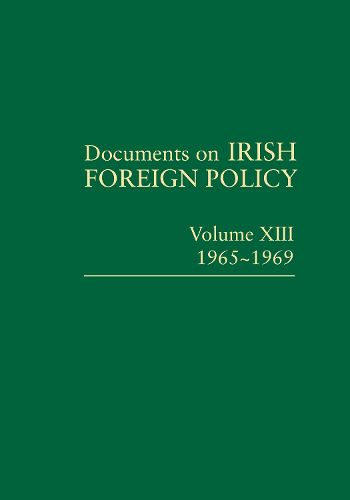Readings Newsletter
Become a Readings Member to make your shopping experience even easier.
Sign in or sign up for free!
You’re not far away from qualifying for FREE standard shipping within Australia
You’ve qualified for FREE standard shipping within Australia
The cart is loading…






The thirteenth volume in the Documents on Irish Foreign Policy (DIFP) series runs from April 1965 to July 1969. It covers the Fianna Fail governments of Sean Lemass (April 1965 to November 1966) and Jack Lynch (November 1966 to July 1969) in which Frank Aiken was Minister for External Affairs.
The four years and three months covered by DIFP XIII saw significant changes in the international context in which Ireland conducted its foreign policy. In 1965 the hope of the Department of External Affairs was that Ireland would enter the European Economic Community (EEC) before 1970. EEC entry would take place alongside that of Britain, an Anglo-Irish Free Trade Area (AIFTA) having come into operation in 1966, cementing trade between Ireland and its principal trading partner. Overall, the United Nations would remain the benchmark of global Irish foreign policy. Peacekeeping, advocating nuclear non-proliferation and ensuring the proper financing of the United Nations as well as promoting decolonisation and the universality of the United Nations system within the bipolar world of the Cold War remained central to 1960s Irish foreign policy.
These assumptions were thrown out of balance by the continuing refusal of France to facilitate the expansion of the EEC and EEC membership remained out of reach for Ireland. Dublin's fragile relations with Belfast were destabilised with the emergence of new social and political forces in Northern Ireland and the recurrence of sectarian violence. The Department of External Affairs proved initially unable to respond comprehensively to this new environment in Northern Ireland, which was the precursor to the outbreak of the Troubles in 1969. Improved economic and political relations with London were affected by local and international economic difficulties and also as a consequence of events in Northern Ireland. At the United Nations, superpower politics constrained Irish attempts to follow up the success of the 1968 Nuclear Non- Proliferation Treaty with a major policy initiative on the financing of international peacekeeping missions.
$9.00 standard shipping within Australia
FREE standard shipping within Australia for orders over $100.00
Express & International shipping calculated at checkout
The thirteenth volume in the Documents on Irish Foreign Policy (DIFP) series runs from April 1965 to July 1969. It covers the Fianna Fail governments of Sean Lemass (April 1965 to November 1966) and Jack Lynch (November 1966 to July 1969) in which Frank Aiken was Minister for External Affairs.
The four years and three months covered by DIFP XIII saw significant changes in the international context in which Ireland conducted its foreign policy. In 1965 the hope of the Department of External Affairs was that Ireland would enter the European Economic Community (EEC) before 1970. EEC entry would take place alongside that of Britain, an Anglo-Irish Free Trade Area (AIFTA) having come into operation in 1966, cementing trade between Ireland and its principal trading partner. Overall, the United Nations would remain the benchmark of global Irish foreign policy. Peacekeeping, advocating nuclear non-proliferation and ensuring the proper financing of the United Nations as well as promoting decolonisation and the universality of the United Nations system within the bipolar world of the Cold War remained central to 1960s Irish foreign policy.
These assumptions were thrown out of balance by the continuing refusal of France to facilitate the expansion of the EEC and EEC membership remained out of reach for Ireland. Dublin's fragile relations with Belfast were destabilised with the emergence of new social and political forces in Northern Ireland and the recurrence of sectarian violence. The Department of External Affairs proved initially unable to respond comprehensively to this new environment in Northern Ireland, which was the precursor to the outbreak of the Troubles in 1969. Improved economic and political relations with London were affected by local and international economic difficulties and also as a consequence of events in Northern Ireland. At the United Nations, superpower politics constrained Irish attempts to follow up the success of the 1968 Nuclear Non- Proliferation Treaty with a major policy initiative on the financing of international peacekeeping missions.